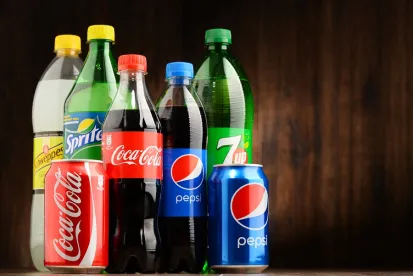A legal challenge to Cook County Illinois Sweetened Beverage Tax (Tax) heads back to circuit court today for a hearing on the plaintiffs’ motion for preliminary injunction. On June 30, Circuit Judge Daniel Kubasiak issued a temporary restraining order (TRO), halting Cook County, Illinois’ imposition of the Tax, which was to take effect on July 1. Judge Kubasiak found that the “Plaintiffs have persuaded the Court that a fair question exists as to the constitutionality” of the Tax.
Earlier this week, the plaintiff group, which includes the Illinois Retail Merchants Association and a group of retail food markets, successfully opposed the county’s emergency appeal of the TRO. In a ruling issued on Monday, July 10, the Illinois appellate court declined to set aside the TRO. While the fight is far from over, the Illinois rulings are a positive development for retailers, who have not succeeded to date in their efforts to defeat the Philadelphia sweetened beverage tax. See Opinion, Williams v. City of Phila., Nos. 2077 C.D. 2016, 2078 C.D. 2016 (Pa. Commw. Ct. June 14, 2017).
The Illinois Complaint asserts that the Tax is facially unconstitutional on two grounds. First, the Tax violates the uniformity clause of the Illinois Constitution (Ill. Const. art. IX, § 2 (requiring that “classes shall be reasonable and the subjects and objects within each class shall be taxed uniformly”)) because identically sweetened beverages are arbitrarily classified as both taxable and non-taxable. For example, “ready-to-drink, pre-made sweetened beverages” (such as sweetened ice tea in a bottle) are subject to the tax, while “on-demand, custom-sweetened beverages” (for example, sweetened ice tea mixed by a server or barista) are not taxed. Compl. ¶¶ 36-37, Tax §§ 74-851, 74-852(a). The Complaint goes on to assert that even if the beverage classifications were reasonable, they are not reasonably related to the Tax’s alleged purpose of promoting public health and reducing obesity rates because there is no difference in the adverse health consequences associated with sweetened beverages that are subject to the Tax, and those that are not taxed. Compl. ¶ 38.
Second, the Complaint asserts that the Tax is void for vagueness (see Compl. ¶¶ 46-48) because it is subject to multiple, conflicting interpretations. The Complaint asserts that the Tax and the recent regulations that have been issued by the county conflict with federal law prohibiting the collection of state and local tax on purchases of food made with certain federal benefits (i.e, food stamps). Compl. ¶¶ 49-55. The Complaint also alleges that Plaintiffs are unable to calculate with any precision or certainty the amount of Tax due on purchases of sweetened beverages not in sealed containers (for example, fountain drinks), which exposes them to potential claims of over- and under-collection of Tax. Finally, the Complaint asserts that the regulations for the Tax are internally in conflict and, by requiring the advertised sales price to include the Tax, may run afoul of state and city of Chicago laws which require the sales price to exclude tax amounts. Compl. ¶¶64, 66-67; Tax § 74-852(c).
Cook County Board President Toni Preckwinkle has warned about the loss of revenue if the Tax is not implemented, and stated in a press release that the county will continue to aggressively defend the Tax. At the present time, however, retailers should not collect the Tax. It remains to be seen whether legal challenges will be raised to taxes on sugary and artificially sweetened drinks adopted by other localities, including Seattle, San Francisco and Boulder.




 />i
/>i
